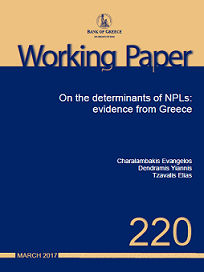Gros, Daniel, (2017), “Debt forgiveness is not the solution for Greece”, CEPS, 23 May The key to understanding Greece’s debt situation is that most of it is owed to the European institutions, which have already extended the maturity to over 30 years and are charging very low interest rates. Expenditure on interest now amounts to 3.2% of GDP, which is much less than what the Greek government had to spend on …Read More
Greece and the Troika – Lessons from international best practice cases of successful price (and wage) adjustment
Belke, Ansgar, Gros, Daniel, (2017), “Greece and the Troika – Lessons from international best practice cases of successful price (and wage) adjustment”, CEPS, 23 May In this paper we present three international best practice (or those considered as benchmarks) cases of successful price and wage adjustment. In this context we critically evaluate the reforms undertaken within the Greek Adjustment Programme (see, for instance, Alcidi et al., 2014). Among the benchmark practice …Read More
Is there a case for intergenerational transmission of female labour force participation and educational attainment? Evidence from Greece during the crisis
Papapetrou, Evangelia, Tsalaporta, Pinelopi, (2017), “Is there a case for intergenerational transmission of female labour force participation and educational attainment? Evidence from Greece during the crisis”, Bank of Greece, April Using logit regressions techniques for binary response models, fit by maximum likelihood with robust standard errors, the analysis investigates the intergenerational transmission of female labour force participation and the intergenerational transmission of educational outcomes in Greece. To conduct this study, we …Read More
Latest Turn in Greek Debt Crisis Is Kafkaesque: QuickTake Q&A
Dendrinou, Viktoria, Nikas, Sotiris, (2017), “Latest Turn in Greek Debt Crisis Is Kafkaesque: QuickTake Q&A”, Bloomberg, 25 April Greece’s next dollop of bailout money is caught in an international dispute with no clear resolution. The heavily indebted Mediterranean nation needs the next installment of about 7 billion euros ($7.6 billion) to repay lenders in a few months, but some euro-area governments, notably Germany, refuse to supply more money until the International Monetary …Read More
Boomerang Kids in Contemporary Greece: Young People’s Experience of Coming Home Again
Tsekeris, Charalambos, Ntali, Evdokia, Koutrias, Apostolos, Chatzoulis, Athena, (2017), “Boomerang Kids in Contemporary Greece: Young People’s Experience of Coming Home Again”, LSE Hellenic Observatory, April 2017 Under the burden of the severe and protracted Greek crisis, it seems that Greek youngsters face an increasingly precarious situation of suffering and transition. This affects them in multiple ways, concerning both the external socio-economic conditions and their internalised sense of self-biographical continuity. …Read More
Macro Dynamics Remain Weak Reflecting Lingering Uncertainty
Alpha Bank Economic Research Division, (2017), “Macro Dynamics Remain Weak Reflecting Lingering Uncertainty”, Greece Economic & Financial Outlook No 91, April Economic activity stalled in 2016 for a second consecutive year. Private consumption growth was a solid 1.4% in 2016 and contributed positively to GDP by one percentage point notwithstanding the tax-driven austerity. Investment remained unchanged, while net exports and public consumption subtracted by 0.5 pps each from GDP growth. …Read More
Greece Needs More Official Debt Relief—But How Much and at What Price?
Zettelmeyer, Jeromin, (2017), “Greece Needs More Official Debt Relief—But How Much and at What Price?”, Peterson Institute for International Economics, 4 April Europe’s Greece problem, which brought the euro area to the brink of a breakup in 2015, is back in the headlines. And so, too, is the issue of whether Greece can succeed without more debt relief—an issue on which European officials remain at loggerheads with the International Monetary Fund …Read More
On the determinants of NPLs: evidence from Greece
Evangelos, Charalambakis, Yiannis, Dendramis, Elias, Tzavalis, (2017), “On the determinants of NPLs: evidence from Greece”, Bank of Greece Working Paper 220, March We investigate the relationship between non-performing loans (NPLs) and their fundamentals, mainly bank and macroeconomic variables. This is done based on aggregate portfolio loans in the Greek economy. Greece constitutes an interesting case to study the factors determining NPLs, given the pervasive recessionary conditions that have characterized it since …Read More
Euro area annual inflation down to 1.5%
Eurostat/Euro area annual inflation down to 1.5% , 31 March 2017 Euro area annual inflation is expected to be 1.5% in March 2017, down from 2.0% in February 2017, according to a flash estimate from Eurostat, the statistical office of the European Union. Looking at the main components of euro area inflation, energy is expected to have the highest annual rate in March (7.3%, compared with 9.3% in February), followed by …Read More
Greece: 2017 Economic Outlook
Monokroussos , Platon, (2017), “Greece: 2017 Economic Outlook”, Eurobank, 1 March Greece’s real GDP came in at -0.4% QoQ / +0.3% YoY in Q4-16 (quarterly national accounts, flash estimate), interrupting two consecutive quarters of positive QoQ growth (Q3: 0.9%; Q2: 0.3%). For the full-year, real output grew by 0.3%, broadly in line with our earlier forecast and compared with a -0.3% projection penciled in the 2017 budget. This translates into …Read More





